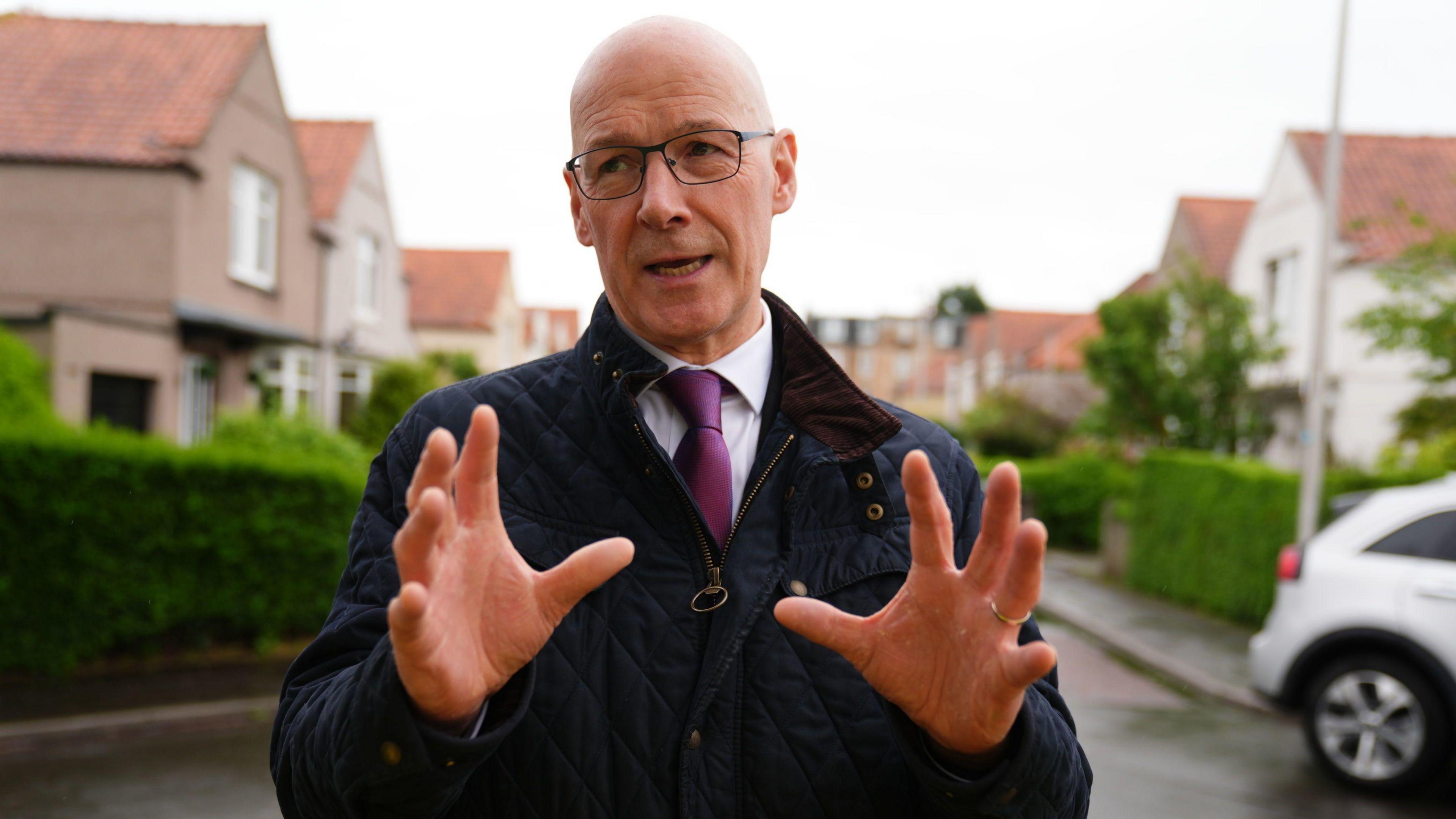Swinney calls on UK government to recognise Palestinian state

- Published
First Minister John Swinney has written to Prime Minister Rishi Sunak and the Labour leader Sir Keir Starmer to demand that they recognise the state of Palestine.
Speaking on a campaign visit to an exhibition of poems written by children in Gaza, the SNP leader claimed his party had been Westminster’s moral compass on the conflict.
And Mr Swinney argued the UK should follow the lead of Ireland, Norway and Spain in recognising a Palestinian state.
In recent months the UK government has said it was considering such a move.
Sir Keir last week said he wanted to recognise a Palestinian state, external if he won power but added it would need to come at the right time in a peace process.
On Monday Mr Swinney said the SNP would force the issue to a vote in the House of Commons after the election.
His predecessor, Humza Yousaf wrote to the prime minister and the UK Labour leader last year calling for the same action.
Two months later the foreign secretary suggested Britain was ready to bring forward the moment when it formally recognises a Palestinian state.
Lord Cameron said Palestinians had to be given a political horizon to encourage peace in the Middle East.
Spain, Norway and Ireland recognise Palestinian state
- Published28 May 2024
The impact of recognising a Palestinian state
- Published28 May 2024
Labour's UK and Scottish leaders have shared differing views on issues relating to the conflict in Israel and Gaza.
Sir Keir previously called for a "humanitarian pause" in the conflict and a sustainable ceasefire.
The Labour leader also insisted Israel had a right to defend itself within international law.
Meanwhile, the party's Scottish leader, Anas Sarwar, backed a motion calling for an immediate ceasefire during his party conference in February.
Despite this, Mr Sarwar previously told BBC Radio's Good Morning Scotland programme that there wasn't "as much distance" between his and Sir Keir's views as some believed.
He said: "Keir Starmer has said he wants the fighting to stop right now and for that to be a sustainable ceasefire. I think we ultimately have the same position."
The Liberal Democrats have been calling for an immediate bilateral ceasefire in order to "stop the humanitarian catastrophe in Gaza, get the hostages out and provide the space for a path towards a two-state solution".
Israel's military campaign in Gaza began after gunmen from Hamas attacked Israel on 7 October, killing about 1,200 people and taking 252 others back to Gaza as hostages.
Nearly 36,000 Palestinians have been killed in the war since then, according to Gaza's Hamas-run health ministry.
What does recognising a Palestinian state mean?
Most countries - about 139 in all, external, external - already formally recognise a Palestinian state.
On 10 May, 143 out of 193 members of the United Nations’ general assembly voted in favour of a Palestinian bid for full UN membership, something that is only open to states.
Palestine currently has a kind of enhanced observer status at the UN, which gives them a seat but not a vote in the assembly.
It is also recognised by various international organisations including the Arab League and the Organisation of Islamic Cooperation.
A minority of European countries already recognise a Palestinian state. They comprise Hungary, Poland, Romania, the Czech Republic, Slovakia, and Bulgaria which adopted the position 1988; and others including Sweden and Cyprus.
But many European nations - and the United States - say they will recognise a Palestinian state only as part of a long-term political solution to the conflict in the Middle East.
This is often referred to as the "two-state solution" where both Israelis and Palestinians agree to have their own states with their own borders.